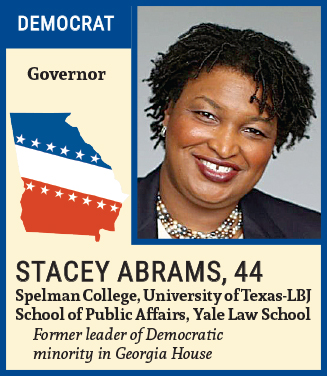Georgia Governor’s Race Close Call in Home Stretch
Polls show a neck-in-neck race for Georgia governor, but watch the Libertarian vote -- it could cause a run off.
Dave Schechter is a veteran journalist whose career includes writing and producing reports from Israel and elsewhere in the Middle East.
In its home stretch, the gubernatorial race between Republican Brian Kemp, the current Secretary of State, and Democrat Stacey Abrams, the former House minority leader, is rated a toss-up.
An Atlanta Journal-Constitution/WSB-TV poll, surveying 1,232 likely voters between Sept. 30 and Oct. 9, showed Kemp with 47.7 percent to 46.3 percent for Abrams. Libertarian Ted Metz had 2.3 percent and 4 percent were undecided.
A Reuters/Ipsos poll conducted Oct. 4 to Oct. 11, of 1,088 likely voters (from a sample of 1,999 adults), put Kemp at 47 percent to 46 percent for Abrams. Metz had 2 percent, other 1 percent, and undecided 4 percent.
The election might not be over on Nov. 6.
Georgia is one of two states that requires a runoff if no candidate in a general election wins a majority of the votes cast in a federal or state-level election.
Should that happen, the top two finishers – presumably Abrams and Kemp – would advance to a Dec. 4 runoff.
Among likely voters in the Reuters/Ipsos poll, Kemp ranked higher in his potential handling of the economy/jobs, crime/law and order, and immigration. Abrams ranked higher on her potential handling of health care, the environment, education, and social issues such as same-sex marriage.
The total votes cast for Republican candidates in the May 22 primaries exceeded that for Democrats by about 54,000, reinforcing the importance of turnout for both Abrams and Kemp.
The money raised by gubernatorial candidates, going back to the primaries, surpassed the $56 million mark in September. It makes this the most expensive quest ever for the keys to Georgia’s governor’s mansion and an annual salary of $175,000, an increase from $139,339 thanks to a bill signed by outgoing Gov. Nathan Deal.
 Candidate for Governor:
Candidate for Governor:
Brian Kemp-R
Brian Kemp, the Republican candidate for governor, believes that his Democratic opponent is vulnerable on issues of interest to the Jewish community.
Speaking to the local chapter of the Republican Jewish Coalition, he said of Stacey Abrams, “It’s important, particularly for people in the Jewish community that traditionally are Democratic voters, to know that this is not your traditional Democratic candidate for governor. This is someone that’s hanging out with Linda Sarsour and is being funded by people like George Soros.”
Abrams was photographed in January at a women’s rally in Atlanta with Sarsour, a Palestinian-American activist and supporter of the Boycott, Divestment and Sanctions (BDS) movement against Israel. Soros, whose support of liberal causes has made him a target of conservatives, made the maximum allowable contributions to Abrams’ campaign.
Kemp, currently secretary of state, said he would build on two-term Republican Gov. Nathan Deal’s expansion of Georgia’s trade relationship with Israel and the purchase of Israel bonds. “I’m going to continue to fight and spread the message that Israel has a right to exist as a state and will not invest in companies that support BDS,” he told the RJC, referencing Abrams’ vote against anti-BDS legislation.
Kemp supported raising the cap on tax credits for donations to private schools through the Student Scholarship Organization program – an important issue for Jewish day schools – from $58 million to $100 million.
He has backed “religious freedom legislation,” which Deal vetoed following opposition by major business interests. But he said that he would veto bills that did not mirror the federal law signed by President Bill Clinton in 1993.
Kemp hopes that his transition from a shotgun-toting primary hopeful to a warmer, friendlier general election candidate will appeal beyond the Republican base.
“Why do you want to go on a different path? Why do you want to go from having a small, efficient government that has us the best state in the country to do business in and go to a big government model that will cause you to raise taxes and will no doubt lower that business ranking?” he asked.
Kemp, who turns 55 four days before the election, received his bachelor’s degree from the University of Georgia. He and his wife, Marty, are the parents of three teenage daughters. The family attends Emmanuel Episcopal Church in Athens.
Kemp was the founding director of a community bank, and has had financial interests in construction, manufacturing and agricultural companies. “I just got really frustrated dealing with government regulations, high taxes and not having someone in office that has the common sense of small business owners,” Kemp told the AJT, explaining why he entered politics.
After serving in the state Senate from 2003 to 2007, he was appointed secretary of state by Gov. Sonny Perdue in January 2010 when Karen Handel resigned to run for governor. He won election to the office in November 2010, and again in 2014.
Kemp finished second out of five candidates in the May 22 primary and then – boosted by a late endorsement from President Donald Trump – defeated Lt. Gov. Casey Cagle in the July 24 runoff.
According to his Sept. 30 campaign finance report, Kemp had raised $16.87 million, spent $10.27 million, and had cash on hand of $6.6 million.
As secretary of state, he has been under fire over the security of voter registration information, registrations being questioned weeks before the election, the use of voting machines that do not produce a verifiable paper trail, and rejecting federal assistance when states were notified of Russian attempts to hack into voting machine systems.
Kemp, whose net worth has been placed at $5.2 million, has been attacked by Democrats for an unpaid $500,000 loan guaranteed to a businessman. Kemp is disputing the debt in court, claiming that the money is owed not by him personally, but by an agriculture company in which he has an investment.
 Candidate for Governor:
Candidate for Governor:
Stacey Abrams-D
Stacey Abrams’ Jewish supporters may feel that they have spent more than enough time vouching for her to their community.
When a controversy arose last year over Abrams’ vote against legislation denying state contracts to businesses that boycott Israel, she wrote an op-ed for the Atlanta Jewish Times in which she explained that it should not be the state’s role to decide what boycotts it would support and which it would oppose.
“Let me be clear: I unequivocally support a two-state solution as the path to resolution of the Israeli-Palestinian conflict, with Israel as the national homeland for the Jewish people. Moreover, I reject the demonization and delegitimization of Israel represented by the BDS (Boycott, Divestment and Sanctions) narrative and campaign,” she wrote.
Abrams has said she would continue Georgia’s growing trade relationship with Israel and lead a trade mission to Israel.
Jewish backers note that she is an alum of the American Jewish Committee’s Project Understanding program and has visited Israel.
Polls of the Jewish community find Israel not to be the highest priority for most American Jews (some 70 percent of whom identify as Democrats), and Abrams’ campaign is based on other issues.
She has made expanding Medicaid access in the state – as a health care and rural development issue – a priority, along with support of public education, and enhancing opportunities for those not benefiting in an economy hailed by Republicans.
Abrams sees the Student Scholarship Organization program, which provides tax credits for donations to support private school scholarships – including at Jewish day schools – as siphoning away funds that should go to public education. She opposed the measure Deal signed into law that raised the cap on the tax credits to $100 million from its previous $58 million.
Abrams has promised to put “religious freedom” legislation “in the grave a final time,” and to work for enactment of hate crimes legislation.
Her first election to the House was in 2006. In 2011, she was elected leader of the Democratic minority in the House, serving until 2017. Abrams vanquished fellow Democrat Stacey Evans, a former member of the Georgia House, in the May 22 Democratic primary, winning more than three-quarters of the vote and all but six counties statewide.
Abrams was a teenager when her parents, both ministers, moved the family from Mississippi to Georgia, to attend the Candler School of Theology at Emory University. She went on to earn degrees from Spelman College, the University of Texas Johnson School of Public Affairs, and the Yale Law School. Abrams is a member of Columbia Drive United Methodist Church in Decatur.
The 44-year-old Abrams has developed a national profile and carries Democrats’ hopes that a “blue wave” will lift her into the governor’s office.
Abrams rebuts criticism of the significant percentage of campaign contributions that she has received from outside Georgia. “I have a national presence because I’ve spent the last decade building the reputation of Georgia, rebuilding the capacity of Georgia Democrats to be seen as viable in a national election,” she told the AJT in March.
According to her Sept. 30 campaign finance report, Abrams had raised $16.25 million, spent $11.33 million, and had cash on hand of $4.92 million.
She has been attacked by Republicans over $50,000 she owes in back taxes and some $170,000 in student loan and credit card debt. Abrams has said that she deferred paying taxes to help her parents with expenses. “I could not defer my family’s needs. I could defer paying my taxes and I am paying them. The IRS and I are in good standing,” she told Atlanta television station WXIA in August.




comments